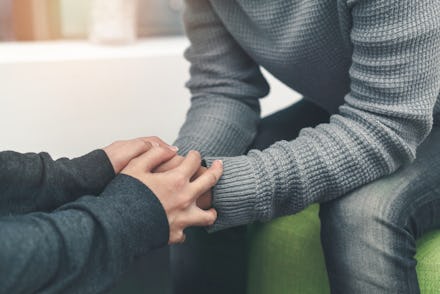There's a thin line between between compassion and codependency

There are a thousand ways to support somebody close to you when they’re going through something challenging, and some people don't require a lot of your time and attention. But let’s talk about the needy friends — the pal, for instance who’s texted you 9000 times about his ex. Break-ups can be painful as hell, but you might want to consider how much your words and presence are really helping him get over the split. Could your good-friend quality actually be making your relationship codependent — are you, in this case, acting as an emotional crutch?
The urgent need for emotional bonding is natural after something messed up happens. And getting attached to people who help us in our time of need is totally normal. The people that I consider my best friends today are those who were there for me during my divorce, for example. But people are at their most vulnerable when they’re going through something challenging. Sometimes they’re looking for a hero, and it’s easy to want to be that hero, but the whole project can backfire if we try to help in the wrong way — by offering the type of attention that enables a person to become dependent on our emotional labor instead of making them feel strong and capable on their own.
Rachelle Thompson, a New Orleans-based psychotherapist, told me that when you allow yourself to become someone’s emotional crutch, you could be repeating patterns of disempowerment, creating codependency. Being supportive rather than codependent can be as simple as helping a friend find a therapist rather than being on high text alert at all hours or showing them how to use Tinder instead of having a millionth conversation about the one that got away. "If they can do something for themselves," she said, "ask yourself whether you should really be doing it for them."
When someone leans on you (like an, um, crutch) for too long, they can forget how to feel OK without you. Even my therapist says that her job is to do her job so well that she doesn’t have a job. Humans are social animals and we will always need friends, of course, but there’s a problem when you start to rely on one person just to get through the day.
“When we are witness to someone’s wounding, we can have care and it can also sometimes blend into trying to care for or be in charge of their experience,” said Thompson. “Sometimes,” she continued, “what we are trying to do is fix, solve, or resolve someone else’s pain.” Not only can we not control or fix other people, it’s not healthy for our relationships when we try.
In other words, while nurturing is a natural empathetic response, we have to be careful that we aren’t overhelping. People in crisis need help, for sure, but they also need to feel empowered. “Are we honoring the power that resides in someone or are we forgetting?” Thompson asked, “there are ways we can support someone’s power or we can hijack it.”
Thompson has a checklist of questions and ideas she developed based, in part, on the work of Melanie Beattie, author of Codependent No More, a book about how to break free from emotionally codependent relationships.
1. Pause. When someone asks for your help and it’s a significant ask, you can request time to think about it. There’s a big difference between someone asking to crash on your couch for the night and asking if they can move in for a month. “Even if it’s just 10 minutes,” Thompson said, “separating yourself from the crisis will help you be thoughtful and give you time to think about your boundaries.”
2. Do you want to? It’s OK if you don’t. People help each other in different ways. If you help someone in a way that makes you feel uncomfortable, you could end up feeling resentful.
3. Do you have the bandwidth to help? If you don’t have extra time, money, space, or emotional resources, you will be going into some kind of debt to help, and it’s important to be honest about that.
4. If you do what they ask, is it of benefit to you, to the other person, and to the relationship? Think about the kind of relationship you want to have with this person. Will it be better or worse if you get involved?
5. Can you give without the promise of recognition? Are you trying to be a hero or to secretly get something in return? This can create an unhealthy power dynamic in relationships.
It can be frustrating and upsetting to watch someone we care about struggle. But ultimately, you can only get them so far. “We can tell people that we will lovingly be there for them,” Thompson said, “but we can’t do other people’s healing for them.” Trying to do someone else’s emotional work can hurt a lot more than it helps.
When my wife and I separated, I told my cousin that I thought it would be a good idea for me to come live out of my camper in her driveway in San Diego. She nodded in a way that said no, and while at the time I felt a little put off, I'm kind of happy to not be living in her driveway. I now own a very lovely home in New Orleans and taking showers with my sweet cousin’s garden hose would have been a major step down in my road to recovery.
My cousin helped by being there for me, but didn't indulge my more irrational ideas that cropped up as a symptom of my sadness—I'm grateful for that.